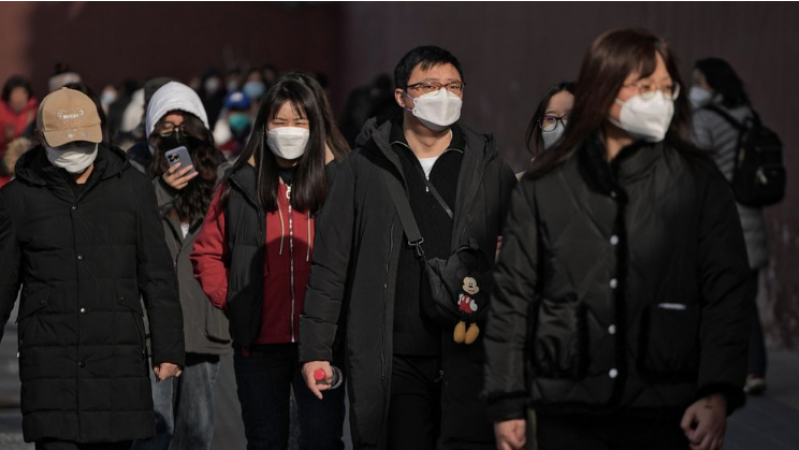
Beijing; China has suspended or closed the social media accounts of more than 1,000 critics of the government's policies over the COVID-19 outbreak, as the country moves towards further opening up.
The popular Sina Weibo social media platform said it has addressed 12,854 violations, including attacks on experts, scholars and medical workers, and temporarily or permanently banned 1,120 accounts.
The ruling Communist Party had relied heavily on the medical community to justify harsh lockdowns, quarantine measures and mass testing, almost all of which were abruptly abandoned last month, resulting in an influx of new cases that strained medical resources. stretched to their breaking point. The party forbids direct criticism and imposes strict restrictions on free speech.
Also Read: Philippines army gets new general after old general retires
In a Thursday statement, Sina Weibo said the company "will continue to investigate and clean up all kinds of illegal content, and create a harmonious and friendly community environment for the majority of users."
Criticism has focused on the largely open-ended travel ban, which confined people to their homes for weeks at a time, sometimes without adequate food or medical care.
Anger was also expressed about the requirement that anyone who tests positive or has had contact with such a person be confined to a field hospital for observation, where overcrowding, poor food and poor sanitation are often reported. was mentioned.
The social and economic costs eventually prompted rare street protests in Beijing and other cities, potentially influencing the party's decision to ease the most stringent measures sooner.
Also Read; United States approves new Alzheimer's drug
China is currently experiencing a surge in cases and hospitalizations in major cities, and is set to spread further in less developed regions as the Lunar New Year travel rush begins in the coming days.
While international flights remain limited, officials expect domestic rail and air travel to more than double from the same period last year, bringing the total numbers closer to the 2019 holiday season before the pandemic.
The Transport Ministry on Friday urged commuters to minimize their visits and gatherings, especially if they include elderly people, pregnant women, young children and people with underlying conditions.
People using public transportation are also encouraged to wear masks and pay special attention to their health and personal hygiene, according to Vice Minister Xu Chengguang during a press conference.
Nonetheless, China is pushing ahead with plans to end mandatory quarantine for foreign visitors starting Sunday.
Beijing also intends to remove the requirement for students in the city's schools to test negative for COVID-19 before returning to class after the holiday on February 13.
Schools will be allowed to move classes online in the event of a new outbreak, but must return to in-person instruction as soon as possible, according to a statement released Friday by the city's education bureau.
However, widespread testing shutdowns, a lack of basic data such as the number of deaths, infections and severe cases, and the potential emergence of new variants have prompted governments elsewhere to impose virus testing requirements for Chinese travelers.
The World Health Organization has also expressed concern about the lack of data from China, while the United States requires travelers from China to have a negative test result within 48 hours of departure.
The Chinese government publishes daily counts of new cases, severe cases and deaths, but these figures include only officially confirmed cases and use a very narrow definition of COVID-related deaths.
Officials claim that since the government ended mandatory testing and allowed people with mild symptoms to test themselves and recover at home, they can no longer provide a full picture of the latest outbreak.
The National Health Commission reported 10,681 new domestic cases on Sunday, taking the total number of confirmed cases in the country to 482,057. Three new deaths were recorded in the last 24 hours, taking the total number of cases to 5,267.
The figures are a fraction of figures announced by the United States, which put the death toll at over one million, out of 101 million cases. However, they are far less than the estimates released by some local governments. One million new cases were reported daily on Tuesday in Zhejiang province, located on China's east coast.
China has said the testing requirements of foreign governments, most recently Germany and Sweden, are not based on science and has threatened unspecified countermeasures. Its spokespeople have said the situation is under control and denied claims of a lack of preparation to reopen.
If a variant appears during an outbreak, it is discovered by genetic sequencing of the virus.
China has shared 4,144 sequences with GISAID, a global platform for coronavirus data, since the pandemic began. That's only 0.04% of the reported cases — a rate more than 100 times lower than the US and nearly four times lower than neighbouring Mongolia.
Also Read; 6-year-old boy shot a female teacher, hospitalized in a critical condition
Meanwhile, Hong Kong plans to reopen some of its borders with mainland China on Sunday, allowing tens of thousands of people to cross without being quarantined.
The virus has devastated the semi-autonomous southern Chinese city, and its land and sea border checkpoints with the mainland have been largely closed for nearly three years. Despite the risks, the reopening is expected to give Hong Kong's tourism and retail sectors a much-needed boost.